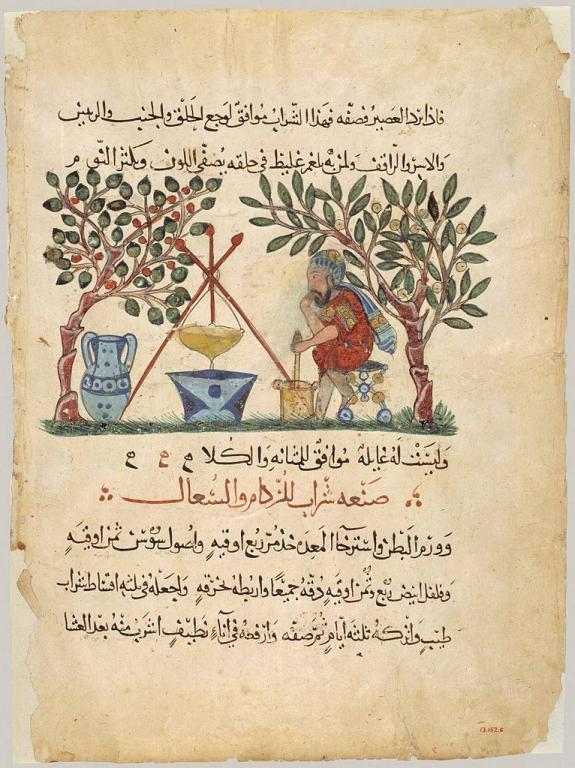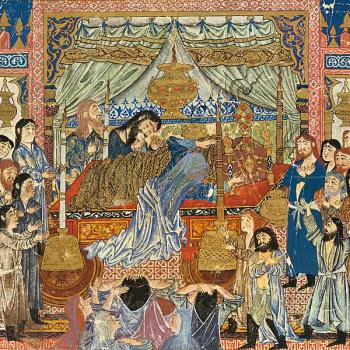
In medicine, the Western debt to the Arabs is every bit as great as in the fields already mentioned. The illustrious Montpelier medical school in France, for instance, was founded by Arab doctors fleeing from Spain during the Reconquista. Up to the end of the sixteenth century, the medical curriculum of European universities was based upon Avicenna’s great textbook al-Qanun (“The Canon”).
A brief listing of Arab innovations in the medical and biological sciences should serve to illustrate how creative they were in this area. Al-Razi, a leading philosopher and physician of the ninth and tenth centuries, was the first doctor to diagnose and correctly describe smallpox. Furthermore, he and Avicenna invented a therapeutic technique that they called al-ilaj al-nafsani, or “the spiritual cure.” It involved leading the patient back to forgotten memories as a step toward his or her recovery and it can easily be considered a ninth-century forerunner to psychoanalysis. By the tenth century, an Arab named al-Majusi had a rudimentary idea of the capillary system. At the same time, a prolific writer named al-Mas‘udi was speculating about the evolution of more complex animals from simpler ones. Was he a precursor of Darwin? Already in early medieval Baghdad, there were hospitals devoted to such specialties as ophthalmology, teaching and training new physicians, and caring for the insane. (And these early mental asylums were a far cry from the barbarous and inhuman places that came along much later in Europe, places like London’s St. Mary of Bethlehem hospital for lunatics, from which our word bedlam comes.) Ibn Khatib, a scholar and physician of fourteenth-century Grenada, was the first known person to recognize the fact of contagion.
During the Crusades, Frankish (Western) and Muslim doctors often worked side by side. The Muslims were appalled by what they saw. For a leg or an arm wound, the Europeans would cut the appendage off with an axe. Not surprisingly, the usual outcome of such “treatment” was either the patient’s instantaneous death or a lingering and painful demise from gangrene. Less drastic treatments, but no more effective in aiding recovery, included shaving the patient’s head, exorcism of the evil spirit that was causing his fever or his infection, or the incision of a cross in the afflicted part of his body to let the sickness, or injury-demon, out. It is small wonder that the Crusader states tended to adopt Arab ways. Once they got a feel for their new Near Eastern environment and realized how far advanced the Muslims were by whom they were surrounded, they were eager to learn. They wanted, after all, to live quality lives. Indeed, they simply wanted to live.
“In the sciences,” writes the German scholar Enno Littmann, “namely in medicine, mathematics, and the natural sciences, the Arabs (or, at least, the people who had adopted the Arabic language) were the master teachers [die Lehrmeister] of medieval Europe.”[1] We have already seen some evidence that this was true with regard to medicine and mathematics. I shall now present some materials on the other sciences, in which the debt is just as plain.
I have mentioned the Arab interest in navigation. Given the vastness of the Islamic world, next to which western Europe seems absurdly small, it was natural that their competence in navigation and geography would be high. They travelled extensively. Ibn Battuta, who lived during the fourteenth century, will serve as a spectacular example of this.[2] He was twenty years junior to Marco Polo and covered far more territory than that famous Italian ever did. It has been estimated that Ibn Battuta travelled seventy-five thousand miles, in an era lacking automobiles, jet aircraft, trains, or even steamships. His travels began, as did those of many others, with the pilgrimage to Mecca and Medina. But he went far beyond that. Leaving his native Morocco, he visited not only all of the Arab countries but also Turkey, Bulgaria, southern Russia, Iran, and and Central Asia. He lived several years in India and then served as an ambassador to China. Later, after returning to Morocco and (perhaps understandably) finding it a bit dull, he travelled to Iberia (Spain and Portugal), and to Mali and Niger in black, sub- Saharan Africa. He even visited the famous and remote city of Timbuktu. Ibn Battuta left behind him valuable memoirs that are increasingly treasured by historians as accurate depictions of the many exotic places he saw, places that are now irrecoverably gone or changed by modern technology and Westernization.
The Arabs were using compasses for navigation by the ninth or tenth century, considerably earlier than the Europeans. But their capacities went far beyond practical navigation. Roger II, the Norman ruler of Sicily, didn’t ask Western geographers to come to his capital of Palermo when he wanted to commission a great book on world geography. He summoned an Arab, instead. And the resulting book, al-Idrisi’s Kitab al-Rujari (“Roger’s Book”), is widely regarded as the best description of the world known to us from medieval times. It was an Arab by the name of Ahmad ibn Majid who navigated Vasco da Gama’s boat during da Gama’s famous and important circumnavigation of Africa. Later on, when Christopher Columbus was looking for Earth’s other pole—the one that Arab geographical theory predicted would lie opposite India or Mecca—he took along a Spanish Jew. Why? I suspect it was because Spanish Jews—remember their role as middlemen, or go-betweens, who helped to transmit Arab learning to the West?—were in the best position of anyone in post-Reconquista Spain to understand and apply Arab geographical and navigational learning. (The last Arab Muslims in Spain—those, at least, who didn’t conceal their faith—were expelled from that country in 1492.) Much of our knowledge of Africa before the great explorations of the nineteenth century (including the names of African animals like the gazelle and the giraffe) came from the Arabs, as well. Leo Africanus, the great sixteenth-century authority on that vast and difficult continent, was actually an Arab by the name of Hasan al-Wazzan.
[1] Enno Littmann, Morgenländische Wörter im Deutschen (Tübingen: Verlag von C. B. Mohr, 1924), 74.
[2] The name is pronounced “Ibn Bah-TOO-tah.”












